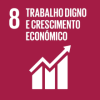
KPOP – More than a Musical Phenomenon, an Economic Machine
The ‘KPOP phenomenon’, the phenomenal success of BTS and associated tourism, generates billions of euros and revitalises South Korea's economy
Sustainable Development Goals (SDG)

The musical phenomenon of K-POP moves from being a regional occurrence to achieving an incredible record of international success, becoming a global cultural and economic force. With special reference to the group BTS, over the last decade, the South Korean music industry has begun to captivate audiences in every corner of the world, being designated as one of the main economic drivers of South Korea. This international success thus begins to have a direct impact on the growth of tourism, cultural interest, and the country's international recognition.
According to the source Hyundai Research Institute, between the years 2014 and 2023, the South Korean group BTS alone estimated an economic impact of 27 billion euros. Highlighting the year 2018, the band generated approximately 3.4 billion euros, equivalent to the revenue value of 25 joint companies. Furthermore, a single concert by the band could project earnings of 850 million euros in the local economy, with fan spending on accommodation, tourism, transport, and merchandising. In fact, K-POP now surpasses the designation of "musical phenomenon", serving as a "gateway" into South Korean culture. Mariana, 25, and Marta, 21, are examples of this. Marta shares that "BTS were the ones who got me into the world of K-POP. I started spending a lot of money on albums, 'merch', and I even invested in learning the Korean language".
For her part, Mariana admits that the phenomenon paved the way for discovering new interests: "beyond K-POP, I entered the world of Korean dramas. It brought me immense cultural curiosity, and I became very eager to travel and visit the country personally". However, beyond the enormous impact of BTS, other K-POP groups have been gaining the same prominence internationally, thus continuing the phenomenon's ongoing expansion. Examples include groups such as Blackpink and TWICE, a group that will perform in Portugal for the first time in 2026. In order to understand the expansion of enthusiasm for other K-POP style groups, an interview was conducted with a fan, Rui, 26, who won the battle to buy tickets for the much-awaited TWICE concert.

Promotional image of Blackpink for the single "JUMP"
Image: YG Entertainment Inc.
Among the lucky thousands, Rui admits "I waited a very, very long time to see TWICE live; I was on the site since dawn to get the tickets". As for expectations for the concert, the young man admits "they are enormous; I have been a fan since 2017, having followed their entire growth". Regarding spending on the concert, Rui states "I have all their albums, I even collect accessories on sale with the group's theme [...] I admit it isn't the most economical activity". Thus, the TWICE concert seems to be something unmissable for this young man. They have, likewise, been conquering various audiences globally, consolidating K-POP as something dynamic and enduring, being in constant reconstruction and reinvention. This growth implements K-POP as a major driver for South Korea's economy and cultural diplomacy, ensuring that it remains current in the coming years. It is the fans' involvement that has contributed to the internationalisation of this phenomenon.

TWICE
Image courtesy of Livenation.
As demonstrated by Kim Su-Jin of Ewha Womans University in an interview, "the more fans [...] see the group as close friends, the closer they feel to Korea as a country" (The Dong-A Ilbo, 2022). In agreement, referring to the possible return of BTS in 2026, Chae Jee Young, of the Korea Culture & Tourism Institute, underlines "the fans' passion [...] will resurge, and this could create a greater impact than before" (Channel News Asia, 2024). The growth of this phenomenon is accompanied by the constant and notable growth of K-POP's digital presence, reaching a total of 600 billion views on platforms such as TikTok, YouTube, and Spotify.
With this digital impact, K-POP continues to reinvent itself, becoming an identity, commerce, and culture. According to Lee Jang-woo, of Kyungpook National University in the news by Dong Sun-hwa, "They use social media intelligently to reach global audiences and create innovative content [...]" (The Korea Times, 2021). Whether due to the contagious rhythms, the choreographies everyone wishes to replicate, or the innovative stories created by the music, the musical phenomenon of K-POP shows that it is here to stay. K-POP is, thus, beyond a musical force, a true economic and cultural engine.
News authored by:

Ana Azevedo
3rd-year student of the Bachelor's Degree in Communication Sciences
Article produced within the context of the Journalistic Writing Techniques course.










